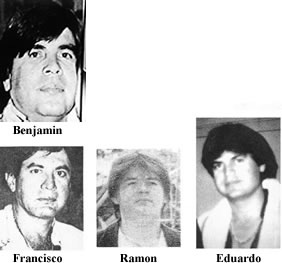 |
 |
 |
 News from Around the Americas | May 2007 News from Around the Americas | May 2007  
Paperwork Delay Curbs Extradition of Top Drug Lord
 Kevin G. Hall & Marisa Taylor - McClatchy News Service Kevin G. Hall & Marisa Taylor - McClatchy News Service


| | The Arellano-Felix Brothers (DEA.gov) |
The United States missed a chance in January to take custody of Mexico's most notorious alleged drug baron because U.S. officials hadn't filed a timely extradition request with Mexico, an investigation by The McClatchy Co. has found.

On Jan. 19, Mexico handed over 15 Mexican nationals sought by the U.S. justice system, including the alleged bosses of the Gulf and Sinaloa drug cartels and eight other high-level drug suspects.

But Alberto Benjamin Arellano-Felix, the reputed leader of the Tijuana cartel, who has been under arrest in Mexico since March 2002, wasn't among the extradited.

After the slain Colombian kingpin Pablo Escobar, Arellano-Felix _ known as "Min," short for Benjamin _ is arguably among the most infamous of suspected drug lords anywhere. The U.S. government has accused him of working closely with the Revolutionary Armed Forces of Colombia, narco-guerrillas known as the FARC, to convert Mexico into the main drug corridor into the United States.

The Justice Department confirmed to McClatchy that an extradition request for Arellano-Felix was first filed in February, weeks after new Mexican President Felipe Calderon handed over alleged top drug traffickers without warning. Before that move, Mexico rarely handed over suspected kingpins because of its opposition to the death penalty and life sentences issued in U.S. courts.

The Tijuana cartel is among Mexico's most violent and dangerous drug smuggling organizations. Controlled by the extended Arellano-Felix clan, the cartel has dominated the flow of cocaine, marijuana and heroin into California and the rest of the West Coast since the 1990s. The cartel is also responsible for elaborate tunnels built under the Tijuana-San Diego border to ferry drugs.

LONG SOUGHT

Arellano-Felix has been sought by the U.S. government for at least 15 years, and federal grand juries have returned sealed indictments on seven occasions. In the latest, a grand jury in San Diego returned a 28-count indictment that linked ArellanoFelix to drug smuggling and money laundering in December 2003 and to at least 20 murders in the United States and Mexico. In addition, he's alleged to have bribed powerful Mexican politicians, and Mexican authorities suspect that his organization was behind the 1993 assassination of a Roman Catholic cardinal at an airport in Guadalajara.

The Drug Enforcement Administration had offered a $2 million reward for the arrest of Arellano-Felix and a $5 million reward for his brother Francisco Javier Arellano-Felix, who reportedly took over the cartel after Benjamin's arrest in 2002. Francisco Javier was arrested in international waters aboard a deep-sea fishing boat off the Mexican Pacific Coast on Aug. 14 and now faces federal trial in California. He's indicted as a codefendant under the same 28 counts as Benjamin.

The DEA believes that their brother Eduardo is now running the organization, and it has a $5 million reward for information leading to his arrest.

AVOIDING THE ISSUE

During a Jan. 22 news conference on Mexico's surprise extraditions, Department of Justice officials sidestepped the question of why Benjamin Arellano-Felix wasn't among the extradited. DEA officials later suggested that Mexico's notoriously slow legal system was to blame.

In fact, the U.S. legal system proved too slow.

Bryan Sierra, a spokesman for the Justice Department, confirmed to McClatchy that the U.S. Attorney's Office in San Diego sent case documents to Washington last May seeking Arellano-Felix's extradition, four years after his arrest.

It took the Justice Department about five months to translate into Spanish 27 boxes full of documents, at a cost exceeding $100,000, Sierra said. The documents were then sent to the U.S. Embassy in Mexico in October. It took four more months before the U.S. Embassy presented the complicated extradition request to Mexico. But that was after Calderon's government had surrendered some of the drug traffickers most wanted by the U.S. justice system.

A spokesman for the U.S. Embassy, James Dickmeyer, said that once the extradition request was received in Mexico City, embassy officials reviewed it and passed it on "within the normal time frame, taking into account that there was a change of government here on Dec. 1."

Sierra, the Justice Department spokesman, said his agency does not believe that the U.S. Attorney's Office in San Diego erred in not seeking the extradition of Arellano-Felix earlier. He added that "we are still talking with Mexico about extraditing him here, and we'd prefer to discuss the case with the Mexicans, not the media."

Debra Hartman, a spokeswoman for the U.S. Attorney's Office in San Diego, declined to discuss the delay in seeking Arellano-Felix's extradition. | 
 | |
 |



